|
|
|
Sort Order |
|
|
|
Items / Page
|
|
|
|
|
|
|
| Srl | Item |
| 1 |
ID:
110761
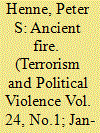

|
|
|
|
|
| Publication |
2012.
|
| Summary/Abstract |
Does religion lead to greater destructiveness from suicide terrorism? And if so, how does it influence this form of political violence? Recent analyses of terrorism point to the significance of religion, but are divided as to whether religion itself matters, or certain types of religious terrorist groups are actually driving suicide terrorist violence. This article draws on social movement theory and recent work in the study of suicide terrorism to argue that religion influences the severity of suicide terrorist attacks as an ideology groups use to justify their struggle and gain public support. This effect occurs regardless of a group's goals or organizational nature. The theory is tested using a generalized estimating equation to account for multiple attacks by several groups. The study finds that the religious ideology of a group greatly increases the number of deaths from a suicide attack, even if varying group motivations and structural factors are taken into account. The article helps to clarify the effect of religion on contemporary terrorism, contributing to the study of both terrorism and religion and politics.
|
|
|
|
|
|
|
|
|
|
|
|
|
|
|
|
| 2 |
ID:
183023
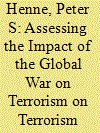

|
|
|
|
|
| Summary/Abstract |
After the 9/11 terrorist attacks, the United States called on Muslims to join it in its struggle against the attacks’ perpetrator, Al Qaeda (AQ). U.S. officials argued that Muslim states’ participation in these efforts could help the United States defeat AQ, but it could also benefit the states themselves by undermining the threat they faced from terrorism. As we are now over ten years out from the beginning of this global war on terrorism, it is possible to both ask and answer the question posed by U.S. demands: did it work? That is, did majority-Muslim states who implemented counterterrorism policies in line with America’s counterterrorism priorities benefit from this, through a reduction in the threat of terrorism? In this article, I argue that Muslim states that adopted policies in line with US priorities would accomplish their primary goal: disrupting Al Qaeda’s ability to carry out attacks. I use a quantitative analysis to demonstrate that states implementing the counterterrorism policies preferred by the United States experienced significantly fewer deaths from terrorist attacks than those that did not. These findings can contribute to debates over the global war on terrorism, as well as broad debates on effective counterterrorism and counterinsurgency tactics.
|
|
|
|
|
|
|
|
|
|
|
|
|
|
|
|
| 3 |
ID:
163438
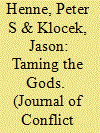

|
|
|
|
|
| Summary/Abstract |
Despite a robust literature on general forms of state repression, the determinants of religious repression remain unclear. This article argues that a regime’s experience with religious conflict will lead it to be more repressive of religious groups within its territory for three primary reasons. Religious conflict increases the behavioral threat posed by religious groups, lowers the cost of repressing these communities, and evokes vivid memories of past religious violence that underscore the role of the state in taming religion to maintain social order. New, cross-national data on religious conflict and repression from 1990 to 2009 show that religious conflict has a significant and positive effect on the level of religious repression for the time period under investigation, expanding the types and severity of government restrictions on religion in a country. Our findings point to the importance of studying the causes and nature of negative sanctions against religious communities, specifically.
|
|
|
|
|
|
|
|
|
|
|
|
|
|
|
|
| 4 |
ID:
117628
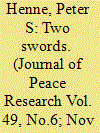

|
|
|
|
|
| Publication |
2012.
|
| Summary/Abstract |
Since the end of the Cold War, a global religious resurgence has transformed many aspects of world politics, including transnational activism, human rights, and terrorism. Yet, scholars still debate whether a generalizable influence of religion on interstate disputes exists. Despite significant progress in the study of religion and world politics, then, the fundamental question remains: under what conditions does the post-Cold War era's religious resurgence influence interstate disputes? This article points to the significance of institutional religion-state connections and ideological distance between disputants to account for the varied significance of religion in interstate conflicts. Religion influences conflict behavior when there are close ties between religion and the state and when a religious state is in a dispute with a secular state, creating ideological distance between the combatants. In such instances, the dispute is more likely to involve the use of force. The article tests this theory through a quantitative analysis of interstate disputes, using a Heckman probit model for the effects of religion-state connections on dispute severity. The tests reveal that while religious-secular dyads do not experience greater risks of conflict compared to other dyads, conflicts involving religious-secular dyads are more severe than those including other dyads, even when numerous competing explanations are accounted for. The article contributes to the study of religion and politics by highlighting the political factors that increase religious effects on international relations; it also contributes to the broader study of interstate crises by demonstrating the means through which ideas can affect interstate disputes.
|
|
|
|
|
|
|
|
|
|
|
|
|
|
|
|
| 5 |
ID:
175344
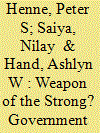

|
|
|
|
|
| Summary/Abstract |
This article addresses a puzzle in terrorism studies. That terrorism functions as a “weapon of the weak” is conventional wisdom among terrorism researchers. When it comes to religious communities, however, often it is those groups favored by the state—rather than repressed minority communities—that commit acts of terrorism. We argue that this is because official religious favoritism can empower and radicalize majority communities, leading them to commit more and more destructive terrorist attacks. We test this claim using a statistical analysis of Muslim-majority countries. Our findings support the idea that the combination of state support of religion and discrimination against minorities encourages terrorism from majority religious groups.
|
|
|
|
|
|
|
|
|
|
|
|
|
|
|
|
|
|
|
|
|